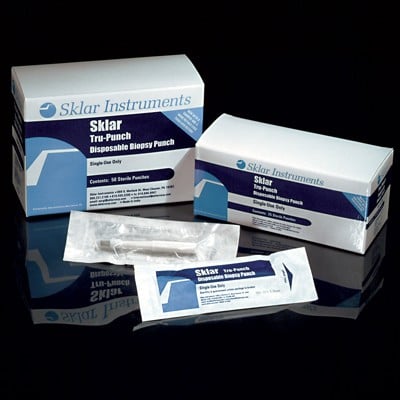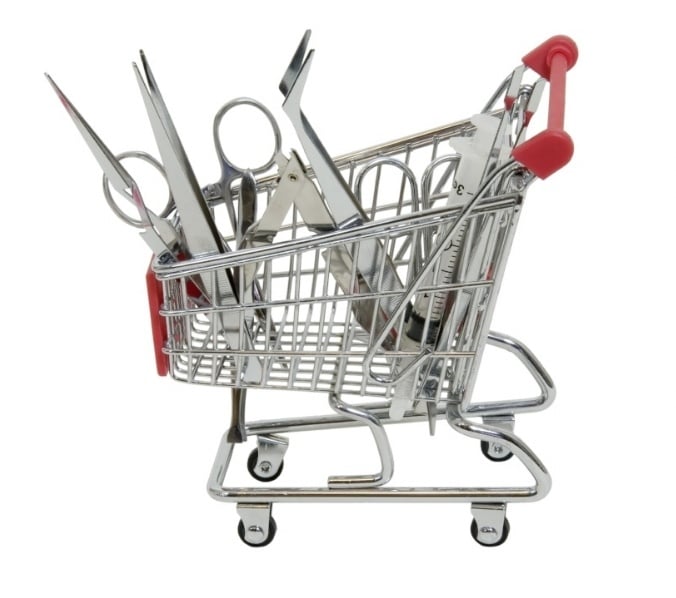Within the last 3 years, JCAHO regulation states that all clinics that are under a Hospital or IDN system need to have a Clean room and a Decontamination room. If a clinic does not have both rooms, instruments will need to be transported to the closest hospital for processing. Instruments should be sprayed with enzymatic cleaner after the procedure and kept moist. A foaming enzymatic will work well to attack the bio-burden and cover the instruments for transport.
Read more about the challenges and lessons in Building a New Central Sterile Processing Department in this article from Infection Control Today, written by William DeLuca Challenges & Lessons in Building a New Sterile Processing Dept
Read More
Topics:
Sterile Processing,
Care & Cleaning,
Sterile Disposables,
Microbial Surface Contamination,
Surgical Instruments,
Patient Safety
SKLAR TIP: Try the Pencil Eraser Test to determine stain or rust.
The next time you see a brown-orange color appear on an instrument, follow this tip on how to tell if it’s rust or a stain: use a standard pencil eraser to determine the source of discoloration. Rub the eraser into the mark, and take note of what happens next.
Read More
Topics:
Care & Cleaning,
Surgical Instruments,
rust stains,
pencil eraser test,
instrument stain
Cleaning Care of Box Joint and Screw Joint Instruments. When cleaned before sterilization instruments, box joint (e.g. Halstead mosquito hemostats, Kelly’s or Crile’s) and screw joint instruments (Mayo scissors, Iris scissors, Metzenbaum scissors) need to be opened to remove any bio burden from these areas.
Read More
Topics:
Care & Cleaning,
Sterile Disposables,
Surgical Instruments
Sklar’s Surgical Instrument and medical supply catalogs are excellent sources for specifications on our surgical instruments and supplies. They provide supplementary information on care, cleaning, and new innovations. Because the healthcare industry evolves frequently, we update our catalogs to reflect changes in surgical instruments in order to provide facilities with the best and most effective instruments.
Discover which catalog is perfect for your facility by reading our infographic on the top five most popular Sklar catalogs!
Read More
Topics:
Sklar,
Sterile Disposables,
Surgical Instruments
Biopsy punches serve many purposes in the global healthcare industry – including utility in diagnostic, therapeutic, and cosmetic procedures. Their simplicity as a surgical tool belies their tremendous impact as one of the first instruments to perform skin biopsy procedures successfully with minimal healing time.
Read More
Topics:
Research,
Biopsy Punch,
Surgical Instruments
Cleaning instruments is an important investment. A thorough care and cleaning regimen is essential in maintaining all of your surgical instruments. Keep up to date on care and cleaning guidelines for instrument brushes by reviewing this brief and fun infographic:
Read More
Topics:
Care & Cleaning,
Surgical Instruments
Purchasing surgical instruments for your healthcare facility? Here are the five steps that reveal how purchasing high quality instruments will drive productivity, quality patient care, cost savings, and surgeon satisfaction.
Read More
Topics:
Insider,
Research,
Surgical Instruments
While most healthcare providers and hospitals do their best to ensure the safety of their patients, safety concerns continue to be an ongoing challenge worldwide. According to the World Health Organization, “one in ten patients are harmed whilst receiving health care.”¹ Facilities aiming to produce better outcomes and patient satisfaction must have patient safety as their top priority—for both the organization and the patients.
Read More
Topics:
Sklar,
Care & Cleaning,
Research,
Healthcare,
Surgical Instruments,
Patient Safety
What is the epigenome?
The epigenome is a mixture of chemical compounds and proteins that attach to DNA and tell the genome what to do. It turns genes on or off, controlling the production of proteins in a particular cell.1 These chemical compounds modify cell division, and may be inherited. Recent studies, however, show that environmental influences, such as diet and exposure to pollutants, can alter the epigenome.2 The epigenome is what makes each individual unique. It is what makes some of us have darker or lighter skin, controls the color and texture of our hair, and explains why some people are more introverted while others are extroverts.3
Read More
Topics:
Sklar,
Research,
Healthcare,
Surgical Instruments,
World Cancer Day
Surgical instruments are specially designed tools that assist health care professionals carry out specific actions during an operation. Most instruments crafted from the early 19th century on are made from durable stainless steel. Some are designed for general use, and others for specific procedures. There are many surgical instruments available for almost any specialization in medicine. There are precision instruments used in microsurgery, ophthalmology and otology. Most surgical instruments can be classified into these 4 basic types:
Read More
Topics:
Sklar,
Sterile Disposables,
Research,
Healthcare,
Single-use Instruments,
Surgical Instruments









